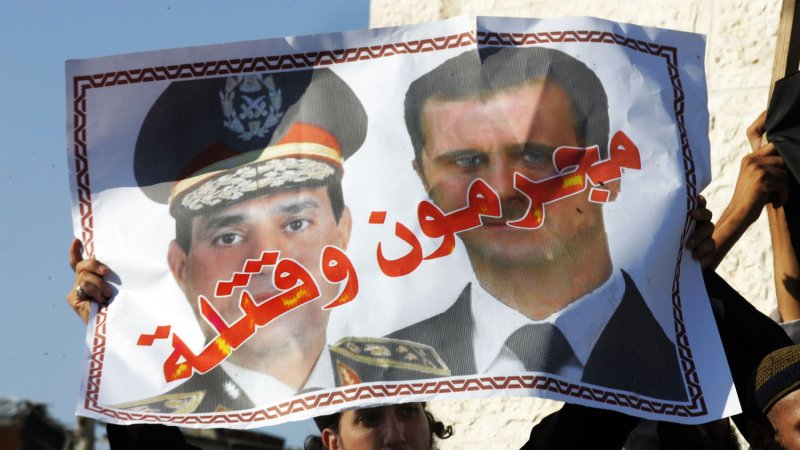1 of 3 | A Palestinian Salafist hold a poster depicting Syria's President Bashar al-Assad (R) and Egypt's army chief General Abdel Fattah al-Sisi with the Arabic words that read "criminals and murderers", during a rally in protest of what they say are recent massacres committed against Syrian and Egyptian people, in Rafah in the southern Gaza , August 22, 2013. UPI/Ismael Mohamad |
License Photo
WASHINGTON, Aug. 23 (UPI) -- U.S. officials held a flurry of talks internally and with allies about possible military action against Syria amid charges of deadly chemical weapons attacks.
Senior officials from the State Department, Pentagon and intelligence agencies -- including Secretary of State John Kerry, Joint Chiefs of Staff Chairman John Dempsey and National Security Adviser Susan Rice -- met for 3 1/2 hours at the White House Thursday to consider options, officials said.
The options ranged from a Tomahawk cruise-missile strike to a more sustained air campaign against the Assad regime, officials told The New York Times.
No decision was made, officials said.
Several news organizations reported a deepening division in the administration between those advocating sending a harsh military message to President Bashar Assad or those who argue such action would be irresponsible and badly timed.
Dempsey this week urged caution, saying even limited military action could embroil the United States in a deeply rooted, multifaceted conflict whose rebels have not shown they would align with U.S. interests if they defeated Assad.
Rice, a former U.S. ambassador to the United Nations, is among those believed advocating a tougher military response, British newspaper The Guardian reported.
Officials would not say Thursday who advocated what position in the White House meeting.
Kerry also held seven calls with his overseas counterparts Thursday, including French Foreign Minister Laurent Fabius, who raised the prospect of military action; Turkish Foreign Minister Ahmet Davutoglu; the Jordanian and Qatari foreign ministers; European Union senior foreign policy official Catherine Ashton, and U.N. Secretary-General Ban Ki-moon, State Department spokeswoman Jen Psaki said.
He also spoke with opposition Syrian National Coalition President Ahmad al-Jarba to express U.S. condolences to the Syrian people over the loss of life and for the pain and suffering, she said.
More than 1,100 people were reported killed in Wednesday's assault, which opposition officials said began shortly after 2 a.m., when Russian-type Grad rockets, similar to those the Palestinian Sunni Islamic group Hamas has fired into Israel, were launched -- two from a highway bridge and others from a Damascus factory.
The Assad regime has denied involvement, and Russia has accused the rebels of staging the attack.
"If we find these reports are true, then we will feel that this has significantly expanded the escalation of the use of chemical weapons by the Syrian regime," Psaki told reporters Thursday.
"The president, the national security team, would certainly have decisions to make, and they have a range of options to decide between," she said.
Among the options discussed at the White House meeting was a Tomahawk long-range cruise-missile strike from a U.S. destroyer in the Mediterranean Sea, officials told the Times.
Another option would be combat aircraft -- jet fighters and bombers -- that could mount an air campaign with munitions launched from far outside Syrian territory, the newspaper said.
Targets discussed for that campaign include missile or artillery batteries that launch chemical munitions or nerve gas, as well symbols of Assad's power, such as government headquarters and offices, officials told the newspaper.















